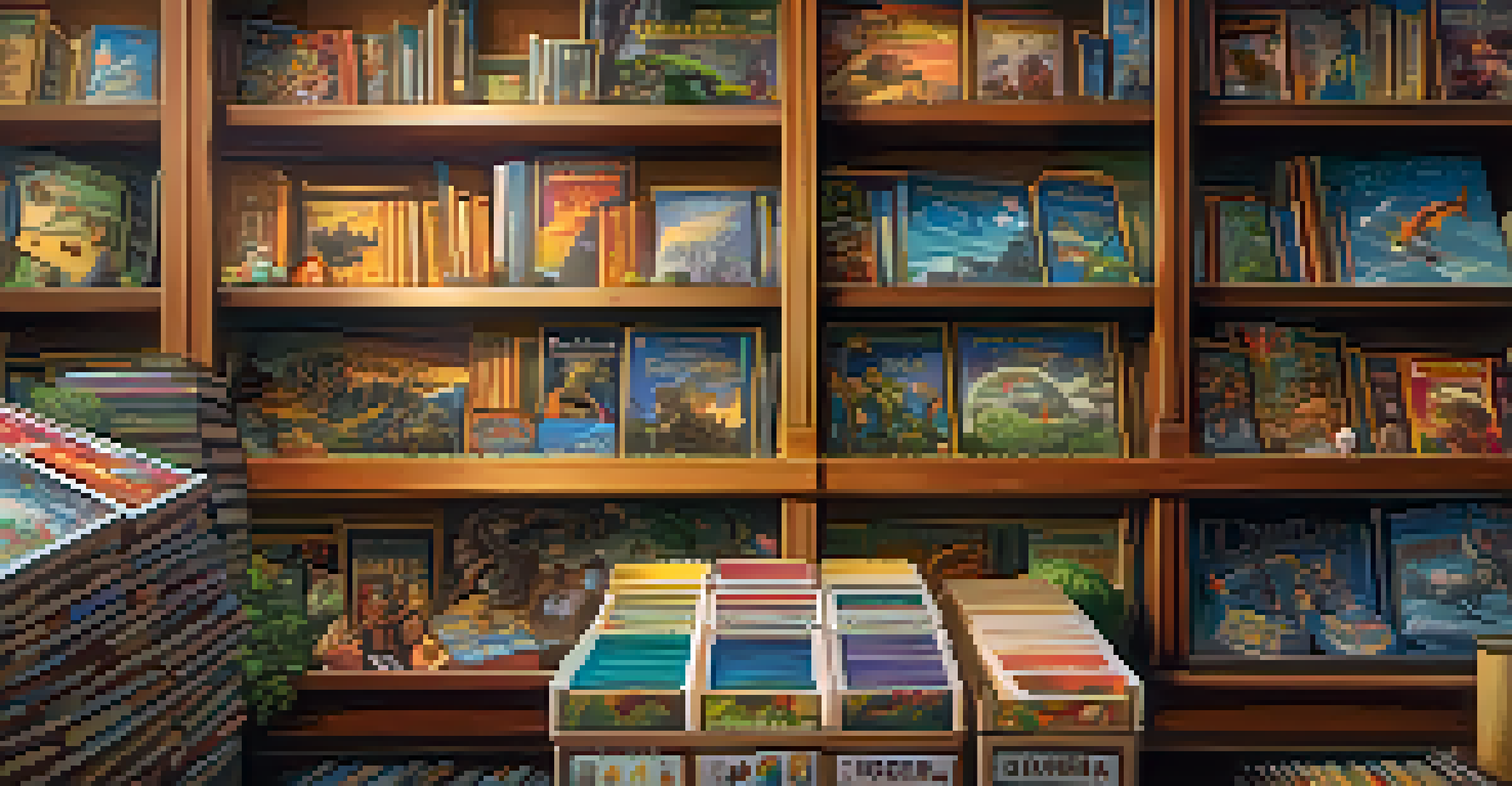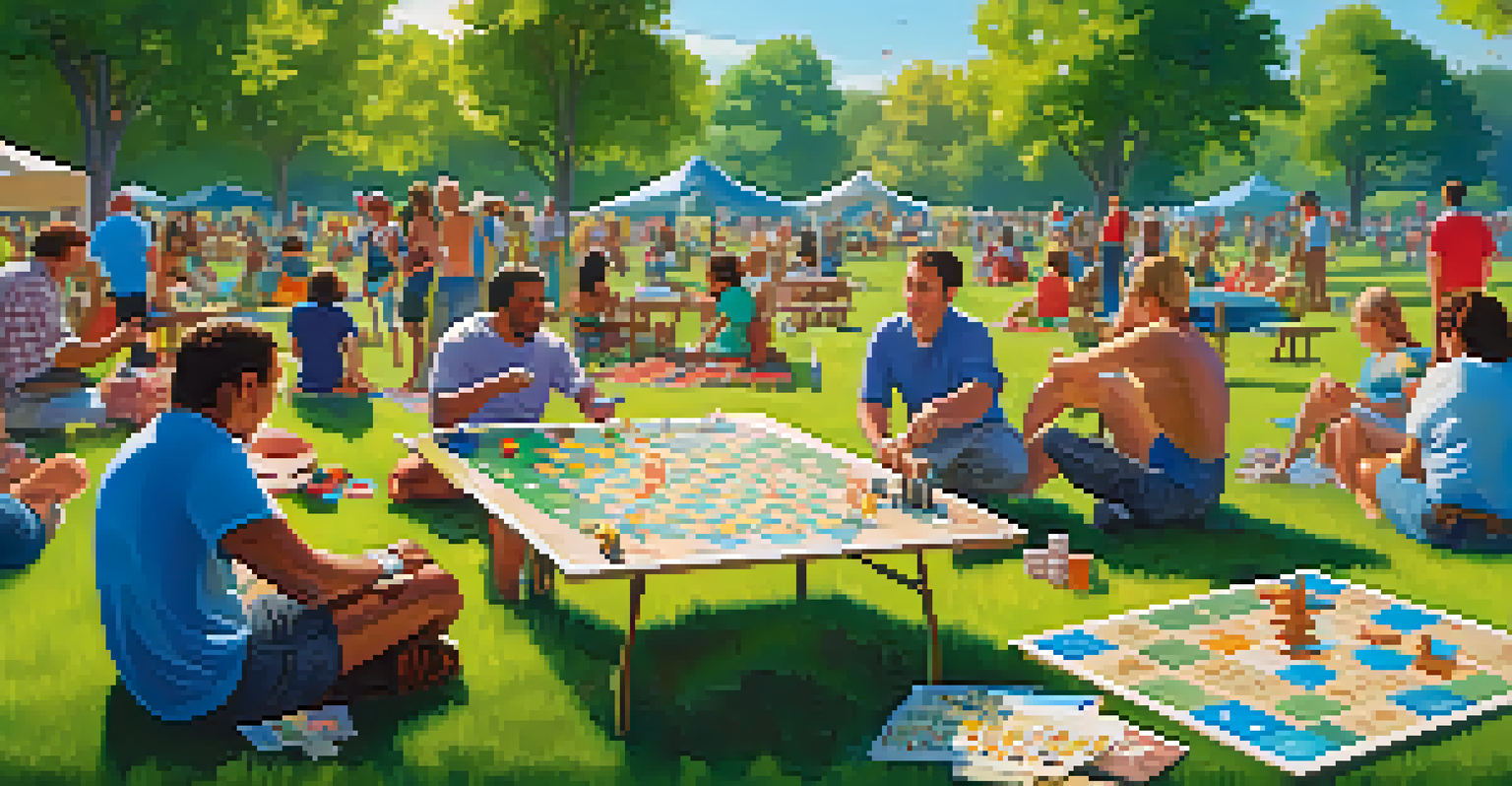Building a Board Game Collection: What to Consider

Understanding Your Gaming Preferences and Style
Before diving into the world of board games, it's crucial to understand your own gaming preferences. Do you enjoy strategy-heavy games, or are you more drawn to light-hearted party games? Identifying your favorite genres can help narrow down your choices and make the collection-building process more enjoyable.
Games are the most elevated form of investigation.
Consider the types of games you’ve enjoyed in the past. Were you captivated by the intricate mechanics of a strategic Euro game, or did you find joy in the social interaction of a cooperative game? Reflecting on these experiences can guide you in selecting new titles that align with your tastes.
Additionally, think about the types of experiences you want to share with friends and family. A diverse collection that includes a mix of genres can cater to different moods and occasions, ensuring that there's something for everyone at the table.
Setting a Budget for Your Board Game Collection
Building a board game collection can be as costly as it is exciting, so it's important to set a realistic budget. Consider how much you’re willing to spend each month on new games, and stick to that limit to avoid overspending. This can also help you prioritize which games are worth the investment.

Remember that board games can range widely in price, from budget-friendly options to high-end, limited editions. Researching average prices can help you better understand where your budget fits in and which games might be worth saving for.
Know Your Gaming Preferences
Understanding your gaming preferences helps narrow down your choices and enhances the enjoyment of building your collection.
Another way to stretch your budget is to explore second-hand markets or local game swaps. These options can not only save you money but also lead to surprises, like finding a rare game that’s no longer in print.
Researching Board Games: Reviews and Recommendations
With so many board games available, research becomes your best friend. Websites like BoardGameGeek offer extensive reviews and ratings from fellow gamers, providing insight into gameplay, mechanics, and overall enjoyment. Taking the time to read through these reviews can help you make informed decisions.
The essence of a game is not the pieces, but the people who play it.
Additionally, watching gameplay videos on platforms like YouTube can give you a clearer picture of how a game plays in real life. Seeing actual gameplay can highlight whether it matches your interests and whether the mechanics seem engaging or overly complicated.
Don’t hesitate to ask friends or fellow gamers for recommendations as well. Personal experiences can lead you to hidden gems that might not be on your radar, creating a more personalized collection.
Considering Game Complexity and Player Count
When adding to your collection, it’s essential to consider the complexity of the games and the number of players they accommodate. Some games are designed for larger groups, making them perfect for parties, while others shine with smaller, more intimate gatherings. Understanding how many players you typically host can help you make better choices.
Game complexity can also impact your enjoyment. If you often play with casual gamers, opt for games that are easy to learn and play. Conversely, if you’re surrounded by experienced gamers, you might want to explore more complex titles that offer richer strategies and deeper gameplay.
Set a Realistic Budget
Establishing a budget for your board game collection helps prioritize purchases and prevents overspending.
Ultimately, striking a balance between complexity and player count ensures that your collection remains versatile and enjoyable for everyone involved.
Exploring Different Game Genres and Themes
One of the joys of building a board game collection is exploring the vast array of genres and themes available. From fantasy and sci-fi to historical and mystery, there’s a game out there for every interest. Mixing genres in your collection can keep game nights fresh and exciting.
Consider including a few thematic games that resonate with your personal interests. For example, if you love classic literature, games based on those themes can lead to deeper conversations and shared experiences. This can create a unique bond between players, making your game nights even more memorable.
Additionally, incorporating a variety of mechanics—like cooperative, competitive, or solo games—ensures that you have options for every mood and group dynamic.
Caring for Your Board Game Collection
Once you start building your collection, it’s essential to take care of your games. Proper storage can significantly extend the life of your board games, so consider investing in protective sleeves for cards and organizers for components. Keeping everything organized also makes setup and takedown much easier.
Regularly inspecting your games for wear and tear can help you address any issues before they become significant problems. For instance, if you notice a damaged component, replacing it sooner rather than later can keep your game playable and enjoyable.
Explore Community Connections
Joining board game communities can provide valuable insights, recommendations, and opportunities to discover new games.
Additionally, fostering a culture of care among your gaming group encourages everyone to treat the games with respect. Establishing a routine for handling and storing games can instill good habits that benefit your entire collection.
Joining a Community for Board Game Enthusiasts
Connecting with others who share your passion for board games can greatly enhance your collection-building experience. Joining local gaming clubs or online communities can provide support, recommendations, and opportunities to play new games. Community members often have valuable insights that can guide your purchasing decisions.
Participating in board game events, such as conventions or game nights at local cafes, can expose you to a variety of games and styles. These gatherings are not only fun but also a great way to discover games you might not have considered otherwise.

Moreover, sharing your collection and experiences with others can lead to new friendships and a sense of belonging in the gaming world. After all, the joy of board games is often best experienced together.